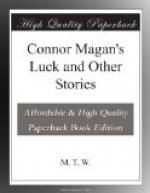CONNOR MAGAN’S LUCK.
[Illustration: “Connor.”]
“I’m in luck, hurrah!” cried Connor Magan, as he threw up his brimless hat into the air—the ringing, jubilant shout he sent after it could only spring from the reservoir of glee in the heart of a twelve-year-old boy. Giving a push to the skiff in which his father sat waiting for him, he jumped from the shore to the boat, and struck out into the Ohio river.
Tim Magan, father, and Connor Magan, son, were central figures in a very strange picture.
Let us take in the situation.
It was a Western spring freshet. The Ohio was on a rampage—a turbulent, coffee-colored stream, it had risen far beyond its usual boundaries, washed out the familiar land-marks, and, still insolent and greedy, was licking the banks, as if preparatory to swallowing up the whole country. Trees torn up by the roots, their green branches waving high above the flood, timbers from cottages, and wrecks of bridges, were floating down to the Gulf of Mexico.
It was curious to watch the various things in the water as they sailed slowly along. Demijohns bobbed about. Empty store boxes mockingly labelled dry goods elbowed bales of hay. Sometimes a weak cock-a-doodle-doo from a travelling chicken-coop announced the whereabouts of a helpless though still irrepressible rooster. Back yards had been visited, and oyster-cans, ash-barrels and unsightly kitchen debris brought to light. It was a mighty revolution where the dregs of society were no longer suppressed, but sailed in state on the top wave.
“It is an idle wind which blows no one good,” and amid the general destruction the drift-wood was a God-send to the poor people, and they caught enough to supply them with fire-wood for months. Logs, fences, boards and the contents of steamboat woodyards were swept into the current. On high points of land near the shore were collected piles bristling with ragged stumps and limbs of trees. The great gnarled branches of forest trees sometimes spread over half the river, while timbers lodging among them formed a sort of raft which kept out of the water the most wonderful things—pieces of furniture, and kitchen utensils which shone in the sun like silver.
Cullum’s Ripple is a few miles below Cincinnati. Here the deep current sets close to the shore, making a wild kind of whirlpool or eddy that brings drift-wood almost to land; the rippling water makes a sudden turn and scoops out a little cove in the sand. It is a splendid place for fishermen, but quite dangerous for boats.
Not far above Cullum’s Ripple is situated the Magan family mansion, or shanty. The river is on one side, and two parallel railroads are on the other. On the top of the bank, and on a level with the railroads, is a piece of land not much longer or wider than a rope-walk, and on this only available scrap the Railroad Company have built a few temporary houses for their workmen. They are all alike, except that a morning-glory grows over Magan’s door.




